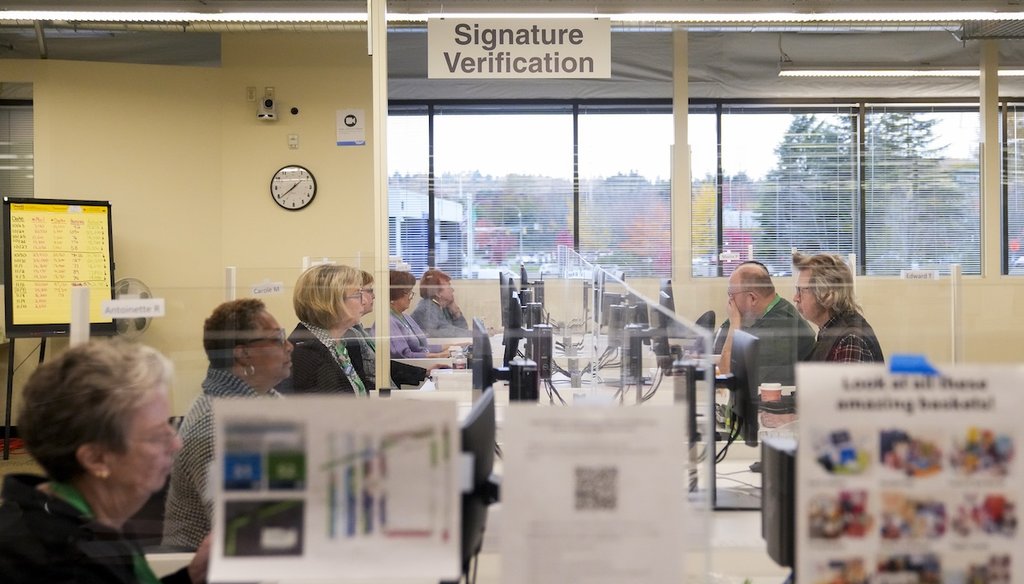Get PolitiFact in your inbox.

Workers verify ballot signatures Nov. 7, 2023, on Election Day at the King County Elections headquarters in Renton, Wash. (AP)
If Your Time is short
-
After Election Day Nov. 7, the FBI alerted election officials that law enforcement is investigating multiple letters containing suspicious substances mailed to election offices in several states.
-
Some of the letters contained traces of fentanyl and are part of a pattern of threats against election workers that increased in 2020.
-
People cannot overdose by only touching fentanyl.
The morning after Election Day, a county election worker in Washington state opened an envelope and found white powder. Election workers would later learn the envelope contained a typed threat: "end elections now."
The threat was unusual for Pierce County election officials, but it was one of multiple jurisdictions that received letters containing powder in recent days.
After Election Day Nov. 7, the FBI told election officials that law enforcement is investigating multiple letters containing suspicious substances that were mailed to election offices in California, Georgia, Oregon, Nevada and Washington.
"In at least four instances, preliminary tests of the suspicious substance indicated the presence of fentanyl," the Nov. 9 FBI notice said.
Linda Farmer, the Pierce County auditor, said her staff evacuated and returned to work in 2½ hours. "It was important to them to show democracy would not be deterred," Farmer said. She added that initial testing showed the substance her office received was baking soda, but the investigation continues.
The letters are part of a pattern of threats election workers have faced since the 2020 election, as some politicians and pundits have spread misinformation about how election workers do their jobs.
Some election offices now stock Narcan, a medicine that reverses overdoses from opioids such as fentanyl. However, merely touching fentanyl is not deadly.
Here’s what we know about the threats to election offices and the misinformation on fentanyl’s effects.
Letters sent to multiple states
Secretaries of state in Washington, Nevada and California confirmed this month that suspicious letters were sent or addressed to jurisdictions in their states.
Police in Washington’s King and Spokane counties said initial testing showed the letters contained traces of fentanyl.
King County election officials also received a letter during the August primary that had traces of fentanyl.
Authorities are investigating two letters in California that were intercepted before they reached election offices. A letter that arrived in Lane County, Oregon, is also under investigation.
Georgia Secretary of State Brad Raffensperger said Nov. 10 on X that law enforcement said that a letter sent to Fulton County had been intercepted.
You cannot accidentally overdose by touching powdered fentanyl or being in a room with it
Receiving letters with unknown powders is threatening and scary. Some powders, such as anthrax, can sicken people exposed to it. However, toxicology experts say that’s not the case with fentanyl.
Fentanyl is a powerful synthetic opioid and its potency makes even a small amount of the drug lethal. However, fentanyl isn’t absorbed well by the skin; for fentanyl to physically affect the body, it must enter the bloodstream.
"It's really hard to get fentanyl into your body unless you directly snort it into your nose, directly drink it or inject it with a needle," said Robert Valuck, executive director of the Colorado Consortium for Prescription Drug Abuse Prevention at the University of Colorado.
People also cannot get sick by being in a room with powdered fentanyl. That’s because it doesn’t easily vaporize.
"People can snort (fentanyl), but this is intentional. It does not just get into the air," Dr. Ryan Marino, a toxicologist and emergency room physician who studies addiction at Case Western Reserve University, said in a February YouTube video. "To cause toxicity from breathing it in you would probably have to be in a wind tunnel with dunes of fentanyl around you."
Attacks on election officials threaten democracy
Many election officials have left their positions because of the threats to their safety.
Reports by advocacy groups show that a large percentage of election workers since 2020 are new in their jobs.
Election administration is a specialized field and it takes time for people to learn procedures and equipment.
"Those with less experience are more prone to making small mistakes based on lack of knowledge — mistakes that, however innocuous, may be interpreted by hyper-partisans as malicious acts," said a September report by Issue One, a democracy-focused advocacy group.
Such mistakes can fuel misinformation, and that misinformation can trigger threats against election workers.
In 2020 and 2022, misinformation wrongly claimed that election workers and voting machines were flipping results.
But local election workers follow state laws and procedures that are designed to thwart voter fraud and include checks and balances to prevent workers from committing wrongdoing.
A Justice Department Election Threats Task Force formed in 2021 has charged 14 cases as of August involving threats against election officials and secured nine convictions. In one case, an Iowa man left death threat voicemails for a local and state official in Arizona, threatening hangings and "torches and pitchforks." The man was sentenced to 2½ years in prison.
"Election officials are just doing their job — they are not putting their thumb on the scale, they are not in charge of what the results are," said Suzanne Almeida, state operations director at Common Cause, a group advocating for accessible voting. "They are incredibly dedicated public servants, especially in the face of these threats."
RELATED: Poll workers are short-staffed, under attack — and quietly defending democracy
RELATED: We fact-checked misinformation about the midterm elections, from Maricopa County to Detroit
RELATED: Pennsylvania voting machine error did not reveal ‘election fraud’
Our Sources
Washington Secretary of State, County elections offices receive suspicious envelopes, Nov. 8, 2023
California Secretary of State, California Secretary of State Confirms United States Postal Service Intercepted Suspicious Packages Headed to Elections Facilities, Nov. 9, 2023
Nevada Secretary of State, X, Nov. 9, 2023
Washington Post, Suspicious letters sent to elections offices in at least five states, Nov. 9, 2023
Renton Police Department, X, Nov. 8, 2023
Issue One, The High Cost of High Turnover, Sept. 26, 2023
Brennan Center for Justice, Local Election Officials Survey, April 2023
PolitiFact, Fact-checking false claims about the 2020 election, Nov. 19, 2020
Eleven Alive, Authorities give update on threatening letters sent to Fulton County election officials, Nov. 9, 2023
KPIC, Suspicious substance found in letter at Lane County Elections office, Nov. 8, 2023
CBS Sacramento, Suspicious envelope headed to Sacramento election office intercepted by USPS, Nov. 9, 2023
Los Angeles County Registrar, Swift Response and Collaboration: Ensuring Election Safety Amid Recent Mail Incident, Nov. 9, 2023
X, post, Nov. 9, 2023
YouTube, The Myth(s) of Fentanyl Exposure, Feb. 28, 2023
University of Colorado Anschutz Medical Campus, Fentanyl and Counterfeit Prescription Drugs: Facts and Myths, Nov. 1, 2022
Centers for Disease Control and Prevention, Guide to Understanding Anthrax, accessed Nov. 10, 2023
Centers for Disease Control and Prevention, The Threat of an Anthrax Attack, accessed Nov. 10, 2023
PolitiFact, Common myths about fentanyl debunked: No, you can’t accidentally overdose by touching fentanyl, Sept. 4, 2023
ProPublica, Roadside Drug Tests Used to Convict People Aren’t Particularly Accurate. Courts Are Beginning to Prevent Their Use, April 25, 2023
KUOW, Suspicious letters targeting Pierce, King elections share striking similarities, Nov. 9, 2023
Georgia Secretary of State Brad Raffensperger, Press conference, Nov. 9, 2023
Georgia Secretary of State Brad Raffensperger, X, Nov. 10, 2023
FBI media office, Statement to PolitiFact, Nov. 10, 2023
Justice Department, Justice Department’s Election Threats Task Force Secures Ninth Conviction, Aug. 31, 2023
Telephone interview, Suzanne Almeida, Director of State Operations, Common Cause, Nov. 10, 2023
Telephone interview, Linda Farmer, Pierce County, Washington auditor, Nov. 10, 2023
Email interview, Halei Watkins, King County Elections spokesperson, Nov, 10, 2023



































